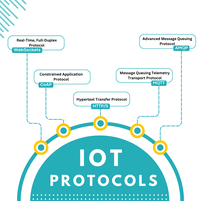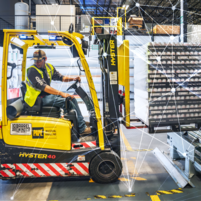Elements of a Smart City Ecosystem

The focus on technology breakthroughs in smart cities frequently overshadows the need for human collaboration in putting digital applications into practice. One of the most critical aspects of creating a more intelligent society is ensuring that the right people are in the right positions. The smart city projects that are most likely to succeed need the participation of a wide range of people and groups. A team should represent your smart city made up of these individuals.
Cities have various ecosystems because of their unique traits. It is essential to take into account a wide range of viewpoints while making a decision. In most smart city projects in the United States, a specific municipal department (the Mayor's office, technology, innovation, etc.) will launch a smart cities program and then turn to well-known faces and obsolete processes and policies to build a smart city plan.
The difficulty of starting anything from scratch lends credence to the possibility that such an event may occur. By working with individuals on your side, you may speed up the process. There are also many options to engage oneself in society that are sometimes overlooked.
To become a "smart city," the following industries must be included in your strategy.
Government
Smart city programs tend to be implemented at the local level, and it's no surprise that the city itself leads to them as the most significant player. However, it would be ideal if all three levels of government participated, municipal, county, and state. Even federal participation might be advantageous in some instances, such as via a quasi-governmental organization like an Economic Development Council.
There is no one government entity at any level of governance. Departments and people with varying technical skill levels and familiarity are at odds over priorities. In addition, many of the government's systems and processes are antiquated. On the other hand, the government moves at a far slower rate than the private sector. The government can and should achieve this goal with exemplary leadership, tactics, and support. Many folks are still a long way away from achieving this objective. Those in other disciplines may have a hard time grasping this notion. Empathy rather than contempt may go a long way toward fostering successful partnerships.
Industry
Including both large corporations and small businesses, the private sector has a lot to offer in the field of smart cities. Cutting-edge technology and research and development, as well as access to global networks, are among the many contributions. For the sector to be engaged in a manner that is based on honesty, there must be an open conversation about the role that companies play. To operate effectively, a corporation must have a set of rules and frameworks in place, which must be well understood by everyone involved.
Authorities in smaller towns and cities occasionally make the mistake of expecting donations from multinational corporations without considering the need for such corporations to create money first. This is a common misunderstanding. A logical assumption is that firms will engage in charitable giving and community service. However, this assumption cannot be made without a better knowledge of the environment in which their activities are located. It is up to the ecosystem to figure out the city's needs and how businesses might help address those needs in a meaningful way. The business sector will be able to contribute effectively after the roadmap has been established.
Founders of Small Businesses
Entrepreneurs are adept at transforming setbacks and setbacks into development opportunities. They know how to use limited resources wisely and prioritize the activities that impact the bottom line most. Entrepreneurs are frequently overlooked and relegated to pitch competitions regarding smart city initiatives. These events have noble intentions but provide little in return for their time and effort.
Startup founders should be included in strategic decision-making processes in a smart city ecosystem. As a result, entrepreneurial thinking may be applied and infused at any stage of the ecosystem's growth. It's critical to encourage the company's representative to challenge conventional thinking, as this is the company's most valuable asset. For a smart city, it's simple to get people together who have the same goals; nevertheless, the greatest results are achieved when the status quo is challenged, and people are pushed to think differently and more effectively.
Academia
Institutions of higher education might significantly contribute to the discussion of smart cities. It is possible to get access to subject matter specialists in the form of faculty and staff as well as the human power of motivated students who are ready to put concepts into practice by partnering with educational institutions such as universities, colleges, and other comparable institutions Additionally, research-oriented universities allow students to conduct experiments in a "safe zone" and get grant funding. Even if your city is home to some of the most intellectual individuals in the country, you'll need to enlist their help and give them a framework in which to do so if you want them to participate.
Members of the Arts and Creative Community
Even though the creative community is sometimes overlooked in the development of smart cities, artists must be engaged in the process of establishing new strategies for cities to become truly 'human-oriented.' As an example of a city that actively engages its creative sector, Manchester, located in the United Kingdom, is a shining light for its smart city initiatives. One of Future Everything's goals is to bring together art and technology in a way that "explores the confluence of these two fields," according to the organization's mission statement. Because of their efforts, the treatment is instantly filled with a sense of vitality and brightness.
Activists and Those in the Nonprofit Industry
The cities of the United States face huge challenges. Global warming, pandemics, homelessness, blighted property, deteriorating infrastructure, and stretched supply networks are just a few of the pressing issues that must be dealt with. Nonprofit organizations are on the front lines of the battle for our freedom. The social sector is at the heart of every community, whether they are advocating for policies that promise more balanced and equitable approaches or providing assistance to the most vulnerable members of society who struggle due to a lack of access to clean water, nutritious food, education, job security, or the internet.
There's a real danger that a smart city's focus on technology could overshadow its ability to effect structural change if community leaders aren't included in the planning process. Nonprofit organizations are acutely aware of the intricacies of social issues. They can serve underrepresented and disadvantaged populations because of their connections. They're aware of it, so it's not a surprise. Establishing an ecosystem that acknowledges and supports the social sector and its members is much smarter than having another sector pretend to have the solutions that would "fix" issues.
Residents
Ultimately, a smart city's goal is to better its residents' lives. People must be at the forefront of technological advancement. Tools such as hackathons and community pitch competitions may be used to speed up and improve the process of involving individual people in smart city development. As we get closer to a future in which everything is digital, we need to include and educate the public on what constitutes a smart city, the ethical problems that must be addressed, and the benefits of integrating connected technology into municipal operations.
Explore more
Need any help in IoT?
Need any help in IoT? An Atreyo expert identify the right solution for your needs.
If ready to talk to an Atreyo expert
Interested in IoT products? go to






